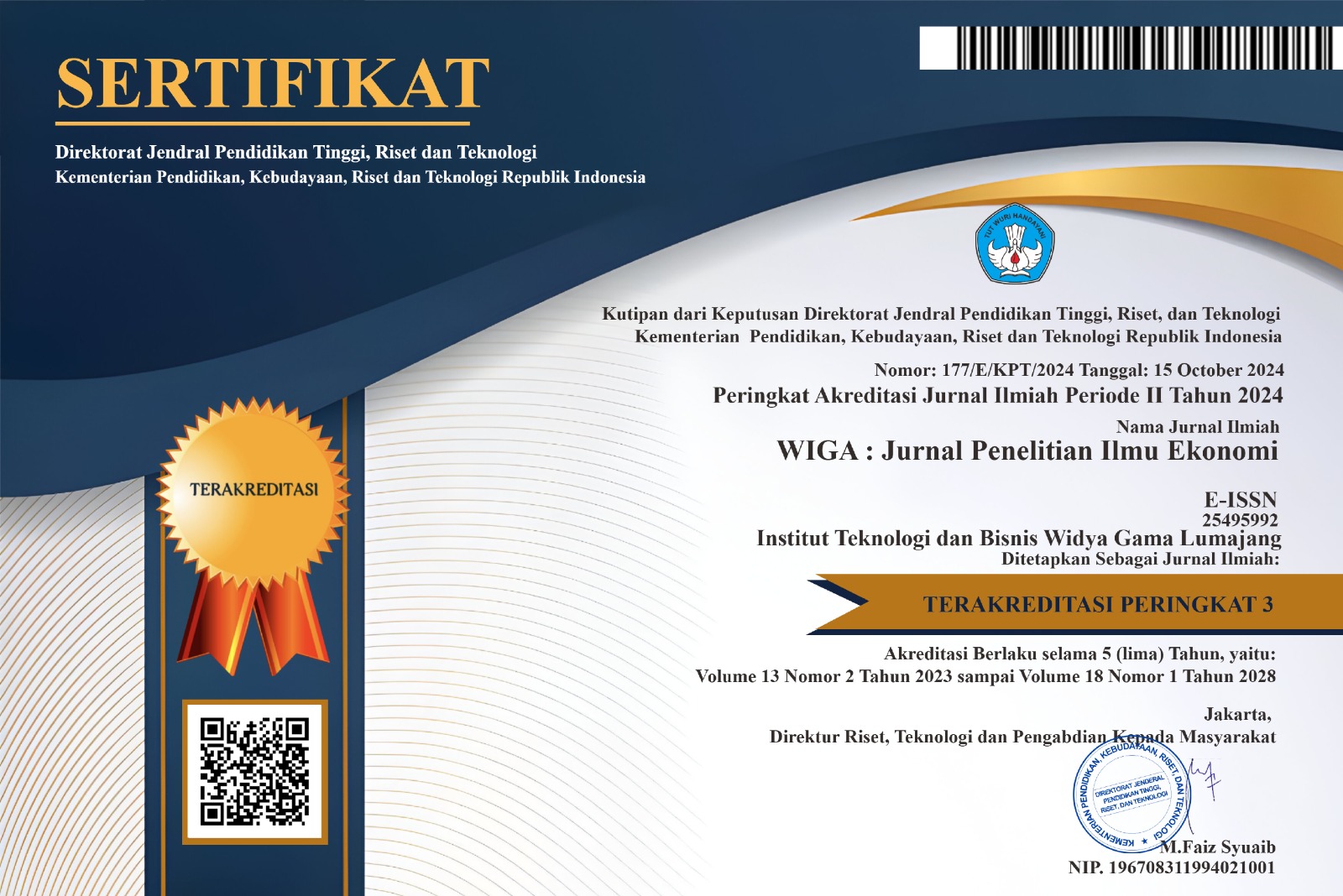Cultivating Flexible Working Through Dynamic Working Arrangement for Public Organization in West Java
DOI:
https://doi.org/10.30741/wiga.v15i2.1473Keywords:
Dynamic Work Arrangement, Flexible Working, Policy ImplementationAbstract
The COVID-19 pandemic has accelerated the adoption of flexible work policies in the public sector, including at the Regional Secretariat of West Java Province. One such initiative, the Dynamic Working Arrangement (Mekanisme Kerja Dinamis or MKD), is crucial for integrating technology and talent management to make the bureaucracy more agile and responsive to change. This study analyzes the implementation of MKD, identifies its challenges, and proposes an ideal development model. To achieve these goals, the research employs a descriptive qualitative method based on policy implementation theory, focusing on an analysis of both policy content and its implementation context. The research process begins with data collection through interviews, observations, and document analysis, with the validity and reliability of the data later being verified through triangulation. The findings indicate that while MKD effectively enhances work efficiency and flexibility, significant barriers persist, such as resistance to work culture change, uneven workload distribution, and limited technological infrastructure. Based on these findings, recommendations for improving MKD include strengthening internal communication, enhancing the digital competencies of civil servants, and reforming performance management systems. With these advancements, MKD is expected to evolve into a more effective and sustainable flexible work model.
Downloads
References
Agustina, I., Rindiani, B., Dellarosa, A., Gunawan, A. A., & Herdiana, S. (2022). How Well are Job Burnout and Engagement Related to Public Service Motivation Among Civil Servants ? Empirical Evidence in Pandemic Setting. Jurnal Ilmu Manajemen Advantage, 6(1), 36–45. https://doi.org/10.30741/adv.v6i1.828
Amirul, S. R., & Shaari, S. C. (2021). An Overview : Twenty Years of Flexible Working Arrangements. Advances in Business Research International Journal, 7(2), 27–41.
Avgoustaki, A., & Bessa, I. (2019). Examining the link between flexible working arrangement bundles and employee work effort. Human Resource Management, 58, 431–449. https://doi.org/10.1002/hrm.21969
Bagaskara, A. I., Hilmiana, H., & Kamal, I. (2021). Influence of Flexible Work Arrangement and Work Environment on Employee Performance Through Work-Life Balance. AFEBI Management and Business Review (AMBR), 6(1), 73–85.
Berkery, E., Peretz, H., Tiernan, S., & Morley, M. J. (2024). The impact of flexi-time uptake on organizational outcomes and the moderating role of formal and informal institutions across 22 countries. European Management Journal, May. https://doi.org/10.1016/j.emj.2024.05.007
Creswell, J. W., & Creswell, J. D. (2017). Research Design: Qualitative, Quantitative, and Mixed Methods Approaches. Sage publications.
Creswell, J. W., & Miller, D. L. (2010). Determining Validity in Qualitative Inquiry. Theory Into Practice, 39(3), 124–130.
Dharmanegara, I. B. A., Sulistyan, R. B., & Agustina, I. (2021). How Well Public Service Motivation and Job Satisfaction in Enhancing the Effect of Compensation on Job Performance? Wiga : Jurnal Penelitian Ilmu Ekonomi, 11(2), 181–192. https://doi.org/10.30741/wiga.v11i2.853
Dudija, N., Putri, R. K., & Kamila, F. N. (2023). Discovering Flexible Working Arrangement Implementation among Indonesian Workers at Digital Sector : The Mediation Role of Work Life Balance. Proceedings of the International Conference on Sustainable Collaboration in Business, Technology, Information, and Innovation, (SCBTII 2023), 185–199. https://doi.org/10.2991/978-94-6463-292-7
Grindle, M. S. (2017). Politics and Policy Implementation in the Third World (2017th ed.). Princeton University Press.
Grindle, M. S., & Thomas, J. W. (1991). Public choices and policy change: the political economy of reform in developing countries. The Johns Hopkins University Press. https://doi.org/10.5860/choice.29-2211
Groen, B. A. C., van Triest, S. P., Coers, M., & Wtenweerde, N. (2018). Managing flexible work arrangements: Teleworking and output controls. European Management Journal, 36(6), 727–735. https://doi.org/10.1016/j.emj.2018.01.007
Hayman, J. R. (2009). Flexible work arrangements : exploring the linkages between perceived usability of flexible work schedules and work / life balance. Community, Work & Family, 12(3), 327–338. https://doi.org/10.1080/13668800902966331
Houghton, K. R., Foth, M., & Hearn, G. (2018). Working from the Other Office: Trialling Co-Working Spaces for Public Servants. Australian Journal of Public Administration, 77(4), 757–778. https://doi.org/10.1111/1467-8500.12317
Kusworo, D. L., & Fauzi, M. N. K. (2022). Work From Anywhere (WFA): Formulation of Policy Design for the Work System of State Civil Apparatus as Government Bureaucratic Efficiency In The New Normal Era. Pancasila and Law Review, 3(2), 127–136. https://doi.org/10.25041/plr.v3i2.2769
Mubarok, S., Zauhar, S., Setyowati, E., & Suryadi, S. (2020). Policy Implementation Analysis: Exploration of George Edward III, Marilee S Grindle, and Mazmanian and Sabatier Theories in the Policy Analysis Triangle Framework. Journal of Public Administration Studies, 005(01), 33–38. https://doi.org/10.21776/ub.jpas.2020.005.01.7
Mungania, A. K., Waiganjo, E. W., & Kihoro, J. M. (2016). Influence of Flexible Work Arrangement on Organizational Performance in the Banking Industry in Kenya. International Journal of Academic Research in Business and Social Sciences, 6(7), 159–172. https://doi.org/10.6007/IJARBSS/v6-i7/2238
Obisi, C. (2017). Impact of Flexible Work Arrangement on Employees Performance in Public Schools in Lagos State, Nigeria. Ideal Journal of Economics and Management Sciences, 3(1), 1–8.
Pradesa, H. A., Maasir, L., & Priatna, R. (2021). Becoming More Burned or Enganged with Job : The Role of Work-Family Conflict and Family-Work Conflict among Public Officers. Proceedings of the 2nd International Conference on Administration Science 2020, 564(Advances in Social Science, Education and Humanities Research), 131–135.
Putranto, R. A., Dawud, J., Pradesa, H. A., Harijanto, D., & Dharmanegara, I. B. A. (2022). Manajemen Talenta Pada Sektor Publik : Sebuah Studi Literatur Serta Arah Model Kajian Untuk Masa Depan. Jurnal Manajemen Dan Profesional, 3(2), 176–211.
Rany, Y., & Tyas, A. A. W. P. (2024). Implementasi dan Pengaruh Transformasi Budaya Kerja Aparatur Sipil Negara Melalui Pengaturan Kerja Fleksibel. Jurnal Ekonomi Manajemen (JEKMa) IMPLEMENTASI, 28(5), 54–61.
Shifrin, N. V, & Michel, J. S. (2021). Flexible work arrangements and employee health : A meta-analytic review analytic review. Work & Stress: An International Journal of Work, Health & Organisations, 36(1), 1–26. https://doi.org/10.1080/02678373.2021.1936287
Shirmohammadi, M., Au, W. C., & Beigi, M. (2022). Remote work and work-life balance: Lessons learned from the covid-19 pandemic and suggestions for HRD practitioners. Human Resource Development International, 25(2), 163–181. https://doi.org/10.1080/13678868.2022.2047380
Soga, L. R., Bolade-Ogunfodun, Y., Mariani, M., Nasr, R., & Laker, B. (2022). Unmasking the other face of flexible working practices: A systematic literature review. Journal of Business Research, 142(March 2022), 648–662. https://doi.org/10.1016/j.jbusres.2022.01.024
Sugiyono, S. (2018). Metode penelitian kuatintatif, kualitatif dan R & D. Alfabeta.
Sultan, Z., Fachmi, M., & Klimko, R. (2024). Flexible Working Arrangement ( FWA ) Model : Reducing Congestion Levels and Work Stress and Increasing Work Productivity. Jurnal Manajemen Bisnis, 15(2), 295–313. https://doi.org/10.18196/mb.v15i2.21578
Wang, W., & Le, J. (2023). A new taxonomy to categorize flexible work arrangements for post-covid organizational work planning. Proceedings of the Human Factors and Ergonomics Society Annual Meeting, 67(1), 310–315. https://doi.org/10.1177/21695067231192925
Williamson, S., Colley, L., & Hanna-Osborne, S. (2020). Will working from home become the ‘new normal’ in the public sector? Australian Journal of Public Administration, 79(4), 601–607. https://doi.org/10.1111/1467-8500.12444
Williamson, S., Colley, L., Huybers, T., & Tani, M. (2023). Public servants working from home during the pandemic: Who gained and who lost? Australian Journal of Public Administration, January 2023, 288–307. https://doi.org/10.1111/1467-8500.12580
Williamson, S., Pearce, A., Connor, J., Weeratunga, V., & Dickinson, H. (2022). The future of working from home in the public sector: What does the evidence tell us? Australian Journal of Public Administration, 81(4), 640–648. https://doi.org/10.1111/1467-8500.12556
Downloads
Published
How to Cite
Issue
Section
License
Copyright (c) 2025 Dadan Amanda, Abdul Rahman, Hafid Aditya Pradesa

This work is licensed under a Creative Commons Attribution-NonCommercial 4.0 International License.










